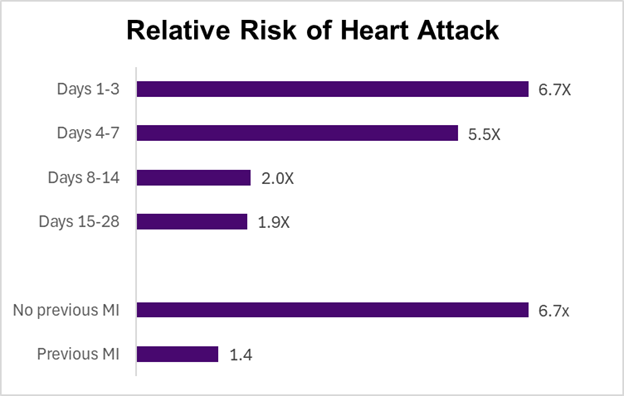Source: de Boer, AR et al NEJM Evidence, June 24, 2024 LINK Days are counted from date of positive influenza test.
Acute respiratory infections can trigger acute heart attacks, although the association is difficult to study because being under medical treatment for one condition can lead to diagnosis of the other. For instance, those who had a heart attack during the COVID-19 pandemic were more likely to get a COVID-19 test when hospitalized, so we could be mistaking a correlation between heart attacks and testing for a correlation between heart attacks and respiratory disease. Previous studies have suggested that as many as one in eight people with an acute heart attack have undiagnosed influenza infections.
Researchers in the Netherlands reviewed patient records of all 159,000 who had PCR tests for influenza in 16 laboratories from 2008-2019, and identified over 23,000 cases of influenza. Of these, 586 had an acute heart attack between a year before and a year after the positive tests - and the researchers examined the likelihood that they had a heart attack around the time of the positive test. They excluded those who had a test performed due to a hospitalization - about a third of those initially identified.
They found that the risk of an acute heart attack was over six times higher for those with acute influenza infections. The risk peaked in the week and month after a positive influenza test. Risks were highest for those with no previous heart attack. The researchers used the rate of heart attacks in this population during other time periods for comparison. They also found that respiratory syncytial virus (RSV) and other respiratory viruses were associated with increased risk of heart attack (3.3x), although the sample size was much smaller. This still reached statistical significance.
Influenza vaccination can prevent severe respiratory illness and hospitalization and prevent time away from work and workplace exposures. We can now add preventing heart attacks as a possible benefit, too.
Implications for employers:
Employers can continue to promote influenza vaccines. For 2024, the influenza and COVID-19 vaccines will continue to be separate, although people can get one in each arm at the same time. A combined vaccine is likely to be available in the fall of 2024. .
Those with employer-sponsored health insurance can receive influenza vaccines without out-of-pocket costs at local pharmacies and provider offices, and many employers make it easy for employees to be vaccinated by offering on-site vaccination clinics.
Employees over age 60 should consider getting an RSV vaccine (I got mine last fall). This vaccination is available at pharmacies and provider offices, and requires no out-of-pocket payment. Although influenza and COVID-19 shots require annual boosters, there is currently no recommendation for an RSV booster shot.



